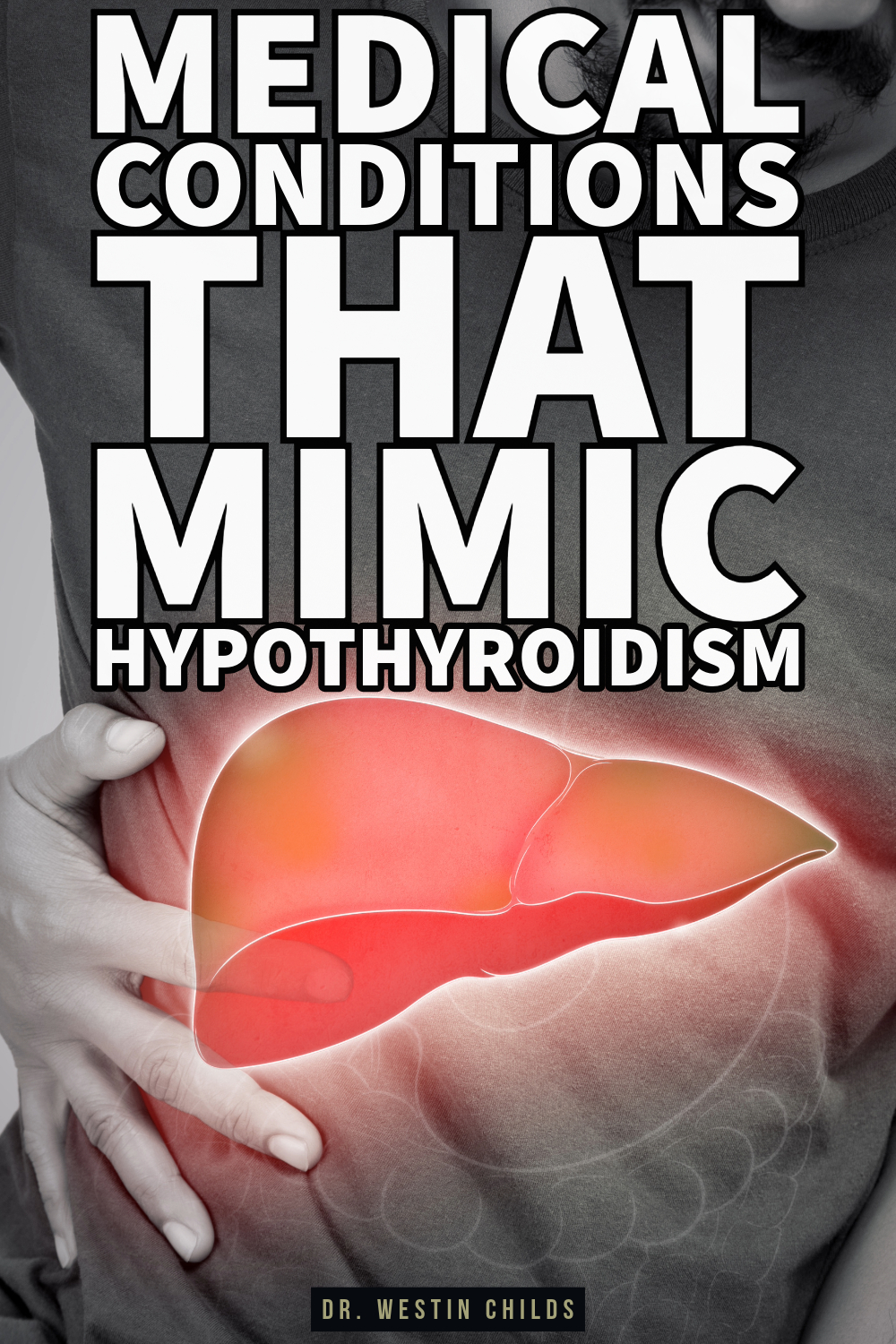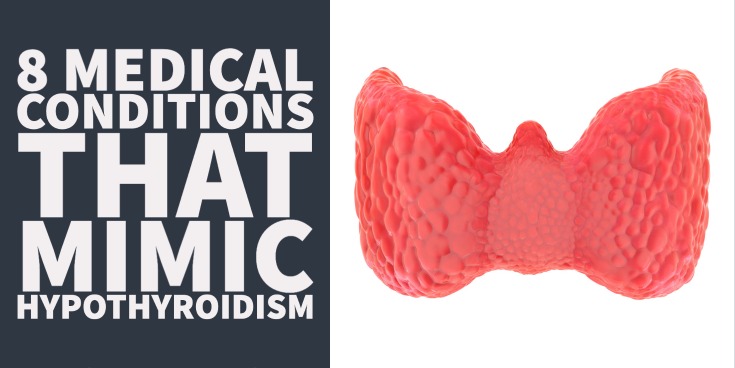I’ve gone on record saying that when a doctor tells you that your thyroid symptoms are in your head you should run, not walk, away.
But that’s not entirely true.
It is definitely the case that sometimes other conditions can run around masquerading like hypothyroidism.
And some of these conditions can mimic the symptoms of hypothyroidism so closely that the only way to tell between the two conditions is with a complete set of thyroid lab tests and a careful eye.
If you’ve been struggling to get your thyroid symptoms under control then this information is incredibly important for you.
Let’s talk about conditions that act and look exactly like hypothyroidism starting right now:
DOWNLOAD FREE RESOURCES
Foods to Avoid if you Have Thyroid Problems:
I’ve found that these 10 foods cause the most problems for thyroid patients. Learn which foods you should avoid if you have thyroid disease of any type.
The Complete List of Thyroid Lab tests:
The list includes optimal ranges, normal ranges, and the complete list of tests you need to diagnose and manage thyroid disease correctly!
#1. Hyperparathydoisim.
Don’t let the name confuse you.
Even though the word thyroid is in the name, the parathyroid gland is completely different from the thyroid gland.
But even though the function of both glands is completely different, the symptoms associated with hyperparathyroidism are incredibly similar to hypothyroidism.
Just take a look:
Excess parathyroid hormone production results in symptoms like…
- Depression
- fatigue
- feeling thirsty
- loss of appetite
- muscle weakness
- constipation
- And brain fog
Hyperparathyroidism results in high levels of calcium from the overproduction of parathyroid hormone which then causes all of the symptoms listed above.
You can diagnose this condition by checking your calcium, parathyroid hormone levels, and vitamin D levels.
What makes things more complicated is the fact that hyperparathyroidism can co-exist with hypothyroidism.
There’s even some evidence to suggest that chronically high TSH levels may cause hyperparathyroidism (1).
So be on the lookout for this condition if you are having trouble managing your thyroid symptoms.
#2. Anemia and low ferritin without anemia.
Anemia is a state of low circulating red blood cells.
When your red blood cells are low, your body’s ability to carry oxygen to your cells will be impaired and you will experience symptoms related to this.
These symptoms include:
- Fatigue
- weakness
- shortness of breath
- pale skin
- chest pain
- and cold hands and feet.
Anemia typically isn’t missed by doctors because they are on the lookout for it but what is missed is low ferritin.
Many people don’t realize that you can be in a state of low iron without experiencing anemia.
And this low iron state can cause symptoms that are sometimes very severe (2).

There are plenty of thyroid patients out there who suffer from low iron WITHOUT anemia who would benefit from taking iron supplements.
You can identify this condition by evaluating your symptoms and by checking your ferritin status which is a really easy blood test to get.
Whether you have a thyroid condition or not, it’s a great idea to check your ferritin and iron status semi-regularly.
#3. Sleep apnea.
It’s estimated that about 20% of the population has sleep apnea and about 85% of individuals who have it, don’t know they have it.
The reason for this is that the symptoms of sleep apnea tend to be very general and broad including things like:
- Fatigue
- Weight gain
- Daytime sleepiness
- Mood changes
- Dry mouth
- Brain fog
- Decreased sex drive
- And headaches
Two of the most notable symptoms on this list include fatigue and weight gain which happen to also be some of the most common symptoms of hypothyroidism.
Before you blame your thyroid, make sure you take a good look at the quality of your sleep.
But do be aware that if you have a thyroid problem you are more prone to developing sleep apnea (3).
So it very well could be the case that you have both a thyroid problem and sleep apnea and each of them needs to be treated separately.
#4. Menopause and perimenopause.
Menopause is another HUGE confounding variable for patients with thyroid disease.
Every woman will go through menopause at some point in her life and the menopausal transition is rife with symptoms that range from mild to severe.
Some of those symptoms include:
- Hot flashes
- Decreased libido
- Sleep problems
- Chills
- Mood changes
- Weight gain
- Hair loss
You’ll notice that menopausal symptoms overlap with both hypothyroidism and hyperthyroidism.
On top of this, the changes in hormone levels that occur at menopause can also cause changes to thyroid hormones as well (4).
So it very well may be the case that menopause is causing symptoms by itself and from its impact on your thyroid as well.
It’s usually pretty easy to identify when you enter menopause, but it can be difficult to differentiate between the symptoms of perimenopause and the symptoms of a thyroid problem.
#5. Fatty liver.
This one is kind of a stretch because often times the first symptom of fatty liver is no symptom at all (5).
It doesn’t tend to cause problems until it gets moderate to severe, but that’s not always the case.
Some patients with fatty liver will experience symptoms like:
- Fatigue and low energy
- Swelling in the legs and ankles
- Dry skin
- And Loss of appetite
Fatty liver can be easily diagnosed with some basic liver function tests and the evaluation of the liver with an ultrasound.
What’s more concerning about fatty liver to me is the impact that the liver has on thyroid function.
Your liver is the primary site of thyroid hormone activation and when it starts to become damaged, this activation is decreased.
So it’s definitely the case that having a liver problem will have a negative impact on your thyroid.
#6. Adrenal fatigue.
There’s a lot of debate about whether or not adrenal fatigue is a real condition, but for the purposes of this video, it doesn’t really matter.
Here’s why:
You can’t deny that chronic stress has a huge negative impact on the body.
So whether or not you want to call it adrenal fatigue or some other name, is irrelevant.
All I am pointing out here is the condition associated with chronic stress results in a predictable set of symptoms that can mimic those of hypothyroidism.
The symptoms associated with this condition include:
- Fatigue
- weight gain
- cravings for salty and sugary foods
- Depression
- Hair loss
- Insomnia
Beyond the similarity in symptoms between both conditions, dysfunction in one gland has a direct impact on the other.
In other words, chronic stress can negatively impact thyroid function and thyroid lab tests like the TSH and low thyroid function can make your body less resilient to stress and alter cortisol levels (6).
In many cases, it can feel like a chicken and the egg scenario when trying to figure out which came first.
In my experience, it makes sense to look for problems in both glands if you have a problem in one or the other.
And, it never hurts to practice lifestyle changes designed to limit your exposure to stress and increase your resilience to stress.
#7. Fibromyalgia.
Another condition that can be confused with hypothyroidism is fibromyalgia.
There are a lot of similarities between these two conditions, including the fact that:
Both conditions can result after a stressful or traumatic event.
Both conditions overlap in their symptoms.
Both conditions get worse with low thyroid levels.
And both conditions can be difficult to treat and diagnose.
There’s some evidence to suggest that low T3 states may actually cause a fibromyalgia-like syndrome.
We also know that T3 thyroid medication can be used to ease the pain in some patients with fibromyalgia.
It’s estimated that hypothyroidism is found in up to 40% of patients with fibromyalgia (7) so it’s very likely that some of these cases are really just hypothyroidism in disguise.
But it’s still very likely that some cases of fibromyalgia are completely unrelated to the thyroid as well.
Either way, you should be aware of the overlap between these two conditions if you have one or the other.
#8. Vitamin and mineral deficiencies.
Vitamins and minerals are important for every system in your body and a deficiency in any one will result in symptoms ranging from specific to broad.
Some nutrient deficiencies cause symptoms that overlap significantly with hypothyroidism like vitamin D deficiency.
Symptoms of this condition may include:
- Fatigue
- Insomnia
- Bone pain
- Depression
- Hair loss
- Muscle weakness
- And a weakened immune system
But this is just one example.
There are plenty of others including deficiencies in zinc, selenium, iodine, and even vitamin B12 which cause a similar situation.
These deficiencies are often missed by doctors (8), so it’s never a bad idea to consider taking something like a daily multivitamin just to make sure your nutrient status isn’t confusing your situation.
Your Next Steps
If this is your first time hearing about these conditions then this may sound overwhelming but it doesn’t have to be.
By far the easiest way to determine whether your symptoms are related to your thyroid or something else is by checking a complete set of thyroid labs.
And if you want to see what tests you need to get to do just that, check this article.
The key here is getting your doctor to order ALL of the right tests. Just getting the TSH is not going to cut it.
If you get all of the right tests and your thyroid is actually normal, then you know to start looking for other issues.
If you get all of the right tests and your thyroid looks abnormal, then you know you need to focus on your thyroid first.
After treating your thyroid for a few months you can take stock of your symptoms to see how you are feeling.
If your symptoms persist then it may very well be the case that you have a combination of problems (this is very common) and each should be addressed.
By taking a systematic approach to your health, you will be able to feel better.
Now I want to hear from you:
Are you currently struggling with persistent low thyroid symptoms?
Have you had a complete set of thyroid lab tests to rule out these other conditions?
Do you believe you have other medical conditions that are causing problems along with your thyroid issue? If so, which ones?
Leave your questions or comments below!
Scientific References
#1. pubmed.ncbi.nlm.nih.gov/9217128/
#2. ncbi.nlm.nih.gov/pmc/articles/PMC8671013/
#3. pubmed.ncbi.nlm.nih.gov/27672073/
#4. pubmed.ncbi.nlm.nih.gov/23998691/
#5. ncbi.nlm.nih.gov/books/NBK441992/
#6. ncbi.nlm.nih.gov/pmc/articles/PMC3520819/
#7. pubmed.ncbi.nlm.nih.gov/28176037/
#8. ncbi.nlm.nih.gov/pmc/articles/PMC8207601/









